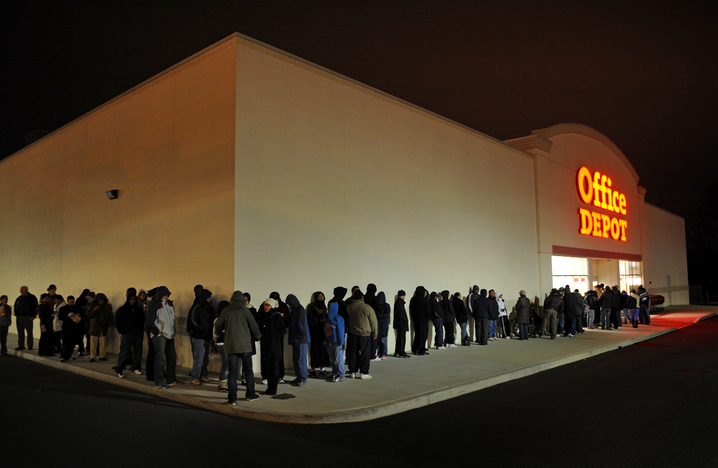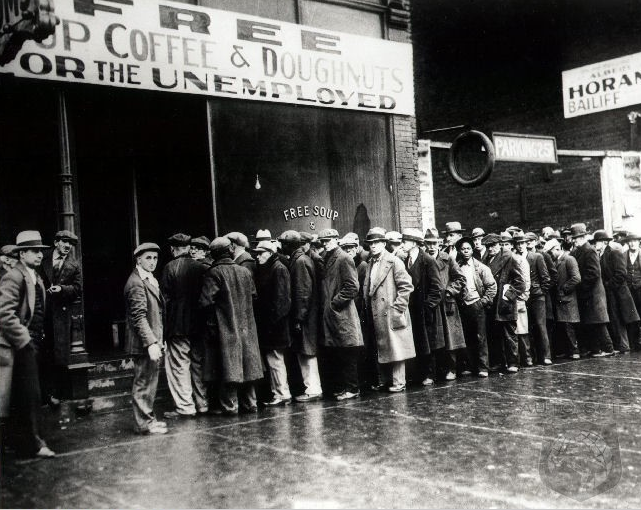Much has been made recently of comparisons between the Great Depression of 1929 and the current economic crisis all the way to the point of framing President-elect Barack Obama as the twenty-first century’s FDR. Only time will truly tell if the analogy will be borne out (no pun intended), but there are good reasons to be skeptical.
The photograph below is one of a number of similar images that appeared in on-line stories and slide shows at a number of major newspapers this past weekend, reporting on “Black Friday”—the so-called “traditional” beginning of the Christmas shopping season.

This photograph shows hundreds of shoppers lining up at 4:30 a.m. at an Office Depot near a mall in the Washington D.C. area, though comparable scenes were more commonly displayed at places like Macy’s and Wal Mart. And while the visual tableau depicts an orderly line of consumers (or are they “utility maximizing rational individuals”?), the opening of the doors at 5:00 a.m. here and elsewhere unleashed a rabid feeding frenzy of consumerist gluttony (and one more for good measure). At a Wal Mart in Long Island, a riotous mob of 2,000 shoppers broke down the doors to the store and trampled a worker to death, all in the interest of saving $20.00 on a 50″ HDTV. And to put it all in perspective, Wal Mart anticipated the problem by hiring extra security and directing the behavior of its shoppers with a posted sign:
Such behavior, whether that of rational calculating individuals or greedy and riotous consumers—or mindless and insensitive store managers—stands in marked contrast with the pictures most often affiliated with the Great Depression—the world that gave us “Black Thursday.”
The difference, of course, is stark and pronounced. Then unemployed citizens lined up for free food (provided by civic organizations of one sort or another) to satisfy their most basic physical hunger; today we line up as consumers to purchase mass produced items (provided by global capitalism) that satisfy a different, fundamentally psychic hunger. Then the government developed public works projects designed to enhance our national infrastructure and to provide employment for those most in need; today the government pumps hundreds of billions of dollars into the economy in order to “ease credit markets” (its own version of the “Blitz Line Starts Here” sign) and to encourage consumption. And we are surprised when citizens accumulate debt by spending on credit rather than saving for a rainy day—or worse, trample and kill fellow citizens to purchase luxury items. Indeed, we actually wonder how we got into the current economic crisis.
It may well be too late to turn back the clock to a time when being a good citizen and being a good consumer were separate identities, but if the soon-to-be President Obama is to live up to the comparison to FDR he is going to need to help Americans to understand the difference between the two, as well as the implications for our national character of the relationship between Black Thursday and Black Friday.
Photo Credits: MIchael Williamson/Washington Post; Fariella/News; Unknown/National Archives


The rhetoric used in Obama’s campaign was so significantly different that it seems many Americans have been able and allowed to really feel the “hope” that he spoke of. Something has happened in this country that, for many citizens, may be beyond symbolic representation. A strong emotional experience has swept much of the nation with Obama’s campaign and election, which is described as hope and relief, but the experience seems to be so powerful that it may be more than words can describe.
It’s impossible to know what will truly end up happening, but we’ve seen that Barack Obama has a way with communicating, or maybe it is his sense of being, that has already begun to change this nation for the better. American’s have become so self-centered and focused on consumerism that it is embarrassing. Obama seems to be capable of providing a sense of pride for American citizens that will be beyond this self-centered consumerism that has become synonymous with “Americans.” We can all have hope for a change in what it means to be American, and if not for our own sake then at least for the sake of future Walmart employees. How pathetic American’s have become that we’d violently and carelessly kill in order to save $20, this is a truly dark time to live in America.
Megan: I think you may be right (but I also fear that you — and many others — are expecting too much from one mere mortal). As you no doubt recognize, hope is not nearly enough, because it ultimately depends on what you are actually hoping for. Can Obama turn around over 50 years of discourse and cultural assumptions that have led to the almost complete reduction of citizenship to consumerism? I don’t know, but as with you I think we have reached something of a low point
Excellent contrast of meaning in similar images that are divided by two generations. It’s interesting to me that in the 30s, the way out of economic depression was “more jobs”, but now in the wake of the recent economic calamity, the way out of recession seems to be “more consumerism.”
Lucaites: I would agree that Obama is simply one human being. I’m not sure one person is capable of flipping the instilled cultural assumptions, and while it is certainly nice to think about and hope for, it probably won’t happen. I suppose what I’m really hoping for is the beginnings of what will become a domino effect. I think we’ve needed a president like Obama to get the ball rolling on cultural changes, but we’ll also need future presidents to continue those changes. I agree that changing 50 years of assumptions in 4 years is most likely impossible, I do think (maybe just hope) that he’ll be able to start something that will become drastic though. The possibilities are always there, something needs to happen to bring them into existence.
The citizen-consumer contrast is an interesting way to address contemporary social and political disparities. It makes sense on some intuitive level to praise the figure of the citizen and its ability to meet basic human needs and condemn the consumer as a self-absorbed acquirer of useless luxuries. But this opposition is limited in its abiltiy to shape political practices because, as John mentioned, the ship has sailed on that era and it is unlikely as a practical matter that we could wish it back. Further, the New Deal inadvertently contributed to the very citizen-apathy that we’re trying to rectify through its creation of the Administrative State. That bureaucracy is clearly necessary to handle political problems of an increasingly complex nature. And yet it also served to sever the citizen from political conversations that have long since become the domain of experts (I think that Lippmann got this part right).
It’s important to have not merely a sense of the shortcomings of citizen-as-consumer, but also an idea about why that mode of identification has become so alluring to so many. One hypothesis: the consumer identity is democratic to the extent that it offers a mode of participation and aspiration that is available to all and whose practices are adaptable to all manner of contingencies. Any ensemble of practices that would hope to change political culture or the social imagination would be wise to acknowledge that strength as it marks ithe ethical and moral limitations of the consumer.
Thanks, Tim, for your well-considered comments, esp on the appeal of the “consumer citizen”. I plan to incorporate this topic into my upcoming course on “Photography’s Civil Contract” (a seminar in public address) and your thoughts are helping me to organize mine.
Tim: I agree with much of your argument. That is why I suggested at the end that Obama (or someone) needs to work out the “relationship” between Black Thursday (as a trope for the depression era) and Black Friday … they are indeed connected in a line of influence. The problem, however, is not just in figuring the allure of the later, but in recognizing how that allure hypertrophied in a way that has erased the “citizen” as anything but an individual driven by unrestrained desire for self and acquisition. Put a bit differently, liberal-DEMOCRACY has given way to LIBERAL-democracy and with it any productive sense of liberal-democracy. Put differently, once again, your suggestion that the consumer is a powerful cipher for the citizen because “it is available to all … adaptable to all manner of contingencies” is no less a romanticized notion (as the increasing number of folks showing up at food shelters might attest to) and, from one perspective, at least, maybe all the more dangerous because it leads to a complete substitute of self for other (as in the Wal Mart incident). I agree that we ignore its power at our peril. But, all risk of inadvertency aside (and I agree with your claims about the inadvertent side effects of the New Deal), I’d still prefer FDR’s New Deal to Ronald Reagan’s America.
This would have been my reasoning if I had the time to investigate. Very good post. Looking at the photos through the links I have to wonder why people must have possessions they don’t absolutely need. Not to be pessimistic but those people probably cannot afford much of what they bought without credit. When jobs are lost and the money is gone what good is a home theater system? Save for your life.